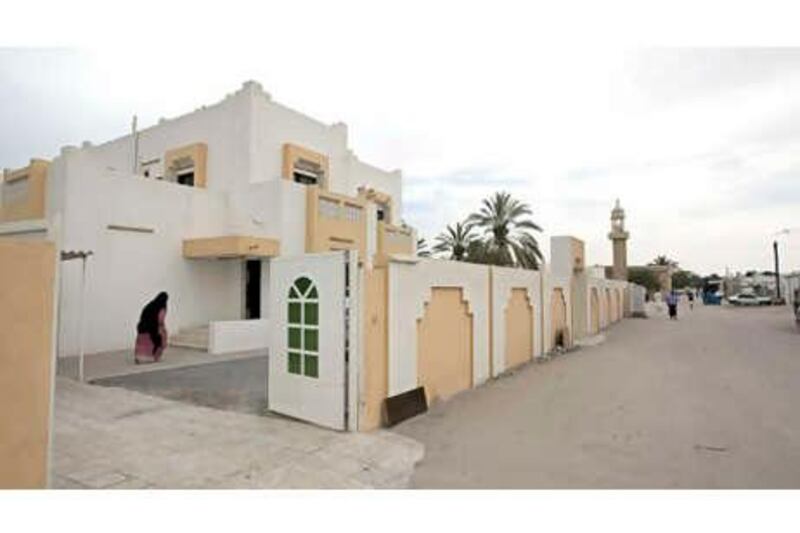RAS AL KHAIMAH // Kaltham al Tamimi's home is a struggle to find. The Emirati - she does not know her age, but says she is older than 70 - lives inside a labyrinthine district in RAK, filled with small shops and bare villas. Shabeyat Tunb was built to house many of the families evicted from their homes in Greater Tunb by Iranian forces on the eve of the UAE's independence in 1971.
The tranquillity of the area is a striking contrast to that harrowing night nearly 40 years ago, the heroics and tragedies of which Mrs al Tamimi remembers vividly. "They took Tunb away by force," she says. Sleepy residents were waking up for the fajr prayers and boats carrying the island's fishermen, who would go to sell their catch in the afternoon in Dubai, were getting ready to leave. "We saw lights, and planes, and those things that move on the ground," she says, referring to armoured vehicles the Iranians carried on their ships. "We hadn't even seen cars before."
Mrs al Tamimi was at home with her family when soldiers rushed in, demanding that they leave. "We left, my father, our family all left within the hour," she says. She reckons that the soldiers were looking for weapons, but, if so, their search was for nothing. "Where would we get the weapons from? What would we do with them?" she asks. "Tunb was the land of safety." It is a sentiment that punctuates much of her recollection of the island, now permanently scarred by the "fearful" six-hour boat ride to RAK, where Sheikh Saqr bin Mohammed, the emirate's Ruler, and his sons, Sheikhs Khaled and Sultan, were waiting for the families.
"We only came here with the clothes that were on us and nothing else. We left all our belongings, our money, our sheep," says Mrs al Tamimi. Sheikh Saqr built temporary homes for Tunb's evicted residents, later creating the neighbourhood of Shabeyat Tunb, which was twice rebuilt. Mrs al Tamimi, whose husband, now dead, served tea at the emirate's Kuwait Hospital, receives a government stipend of Dh2,200 monthly for herself, and another one for her son, who has a mental disability. She lives in a two-storey villa.
Many of the men have died and Tunb's memory is in peril. Mrs al Tamimi has two sons and two daughters, only one of whom still lives in Shabeyat Tunb. "The children didn't understand, not like us. They don't remember, we teach them," she says. "But the children are all gone, all the youngsters have scattered." Though the children may not want to go back, Mrs al Tamimi is adamant that she would return if the islands were back in Emirati hands.
"I would not forget my country. I would not forget Greater Tunb until I die. All of us old people would never forget Tunb island," she says. But little remains of the Tunb that Mrs al Tamimi remembers, because even as she was rushed into the boats with her children, the occupation was already taking its toll. "They destroyed the school, they destroyed the Sheikh's home. They didn't leave anything," she says.
The human cost was manifested in the story of the newlywed Salem Suhail, the operation's only casualty and one of six Emirati policemen stationed on the island. For the likes of Mrs al Tamimi, his story is the stuff of legend. Suhail refused to lower the UAE flag when he was told to do so by the Iranians. When he refused to relinquish his position, he was shot. "Everyone knows him," says Mrs al Tamimi. "Our men buried him."
Her other recollections are less dramatic. They paint the portrait of a small town, homely and unperturbed. "Our land was the land of safety," she repeats. The men would wake at dawn, fish until noon, then return for a nap. Then, they would sail to Dubai, where they would sell the catch. The women also provided for the household. After making breakfast, they would trek inland, chopping and collecting timber. Back home, they would cook and bake for the family and milk the cows.
In the summer, they would escape the summer heat in a wooden lodging, shaded by palm trees. Most of the time, it was quiet. With one exception. "Oh Allah, the weddings in Tunb," says Mrs al Tamimi. "They would play the drums for seven days straight." But even that has changed. "The dowry used to be Dh500. Now the dowries are in the thousands," she says. The island's 40 homes were the domains of a few large families like the house of al Tamimi.
There was a single school, with three teachers, that housed about 30 pupils, boys and girls. Mrs al Tamimi was born on Tunb, but had no formal education beyond memorising the Quran. Her two daughters were in school when they were evicted from the island. They did not complete that school year. Mrs al Tamimi misses everything back home. "If it is returned to the UAE, we would return," she says. @Email:kshaheen@thenational.ae
hdajani@thenational.ae







